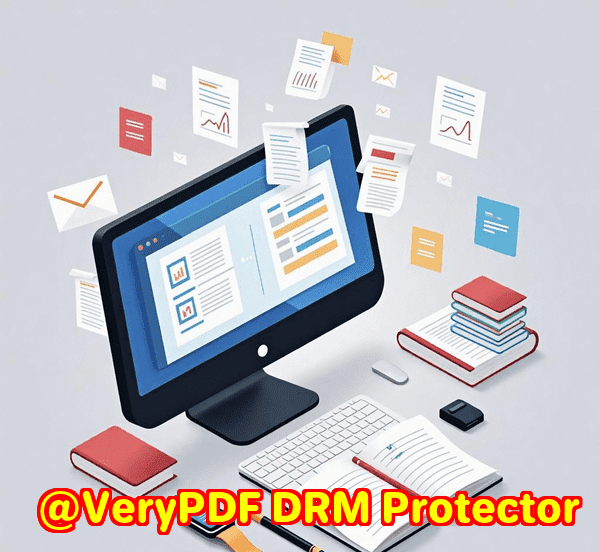How to Archive Medical Documents in PDFA Format Using VeryDOC SDK for Long-Term Preservation
When you’re managing medical documents, one of the most crucial factors is ensuring their longevity and accessibility. Whether you’re handling patient records, medical research, or insurance claims, the documents need to be stored in a format that guarantees both preservation and easy retrieval in the future. That’s where PDF/A comes in. It’s the gold standard for archiving PDFs, ensuring that your documents remain consistent and viewable over the long term, regardless of future technological changes.

In this post, I’m going to show you how to leverage VeryDOC’s PDF to PDF/A Converter Command Line SDK to archive medical documents in PDF/A format, guaranteeing that they comply with ISO 19005-1 standards for long-term preservation.
Why PDF/A for Archiving Medical Documents?
PDF/A is a specialized version of the PDF format designed specifically for digital preservation. Unlike regular PDFs, PDF/A ensures that all elements within a document, such as fonts, images, and color profiles, are embedded in the file. This means that the document can be opened and viewed exactly as it was when it was archived, even if the software used to create it becomes obsolete.
If you work in the medical field, you know how important it is to maintain records that are unmodifiable, searchable, and accessible over decades. Whether it’s a medical research paper, patient discharge summary, or radiology report, PDF/A ensures that these documents remain intact, legible, and compliant with legal standards.
Discovering the VeryDOC PDF to PDF/A Converter Command Line SDK
I first came across the VeryDOC PDF to PDF/A Converter when I was looking for an efficient way to convert and archive a large batch of medical documents for compliance. The tool’s command-line interface (CLI) was an immediate draw for me, especially since I often deal with large datasets and needed something that could be automated to fit into a workflow.
Key Features and Benefits of the PDF/A Converter SDK
Let me break down a few features that made this tool indispensable for archiving medical records:
1. Command-Line Functionality for Bulk Conversion
The SDK operates via the command line, making it ideal for automating tasks. You can convert batches of documents into PDF/A format without having to manually interact with each file. This is crucial for environments like hospitals or research labs, where multiple files need to be processed regularly.
2. Full Compliance with PDF/A Standards
The PDF to PDF/A Converter ensures your documents are fully compliant with ISO 19005-1, a standard for long-term digital preservation. This guarantees that the documents you archive will remain accessible and unaltered for years to come. In the healthcare industry, this is vital because medical documents must be preserved accurately to meet both legal and regulatory requirements.
3. Font Embedding and Optimization
In medical documents, fonts are essential for readability and accessibility. The PDF/A Converter ensures all fonts are embedded, even those that aren’t included in the original file. It also optimizes fonts through subsetting, so your document remains consistent across platforms.
4. Color Profile Adjustment
Medical images, such as X-rays or MRIs, often contain device-specific color spaces. The SDK replaces these with ICC profiles, ensuring that the color representation is consistent, no matter what device is used to open the document in the future.
5. Content Sanitization
PDF/A files cannot contain any interactive content or scripts that could compromise long-term access. The SDK removes JavaScript, interactive forms, and any non-essential content, ensuring compliance with the PDF/A standard and enhancing security.
Personal Experience: How VeryDOC Saved Me Time and Headaches
When I first started converting medical documents, I had a huge backlog of patient records and research articles. Manually converting each document to PDF/A format was a hassle. I was losing time and resources by dealing with repetitive tasks.
I turned to the VeryDOC PDF to PDF/A Converter Command Line SDK, and the change was almost instantaneous.
I was able to convert hundreds of PDFs to PDF/A format with a few simple commands. The best part? I could do this overnight. The tool’s ability to handle bulk conversion meant that I could set up the process and let it run automatically, freeing up my time for more important tasks. Additionally, the fact that I didn’t have to manually embed fonts or adjust color profiles saved me hours of manual work.
Use Cases in Medical Document Archiving
Here are a few ways I’ve used this tool to streamline medical document archiving:
1. Research Papers
Medical research papers often involve a wide range of multimedia elements, such as tables, charts, and images. Converting these papers into PDF/A format ensures they can be preserved for future study, without the risk of losing data integrity.
2. Patient Records
Patient records must be preserved for years, often for legal and insurance reasons. With PDF/A compliance, these records can be archived in a secure format that will remain searchable and viewable in the future, regardless of future software updates or changes in file formats.
3. Radiology Reports
Radiology reports contain both text and high-resolution images. Converting these reports into PDF/A ensures that the images are displayed consistently over time, and the text remains legible. This is especially important when dealing with medical images that may need to be referenced by specialists years down the line.
The Core Advantages of VeryDOC PDF to PDF/A Converter SDK
When it comes to archiving medical documents, several key advantages of the VeryDOC PDF to PDF/A Converter stand out:
-
Simplicity: The command-line interface is simple to use and can be easily integrated into existing workflows.
-
Reliability: The tool ensures that documents are properly converted and compliant with PDF/A standards.
-
Automation: Automating the conversion process saves time, allowing you to process large volumes of documents without manual intervention.
-
Security: By removing potentially harmful content like JavaScript and interactive forms, the tool adds an extra layer of security to your archived documents.
-
Scalability: Whether you’re archiving a handful of documents or processing thousands, the SDK handles it with ease.
Final Thoughts and Recommendations
If you’re in the medical industry and need to archive documents for long-term preservation, I highly recommend giving the VeryDOC PDF to PDF/A Converter a try. The time and effort it saves are worth its weight in gold, especially for large-scale operations where document management can quickly become overwhelming.
Start your free trial now and ensure your medical documents are stored securely and in compliance with ISO standards.
Click here to try it out for yourself: https://www.verydoc.com/pdf-to-pdfa.html
Custom Development Services by VeryDOC
If you need more tailored solutions to meet your specific technical requirements, VeryDOC offers custom development services. Whether you’re dealing with large volumes of medical documents, need a specific file format conversion, or require specialized functionality, VeryDOC can provide solutions built to suit your needs.
From PDF processing to OCR technology and document security, VeryDOC’s team is ready to help you integrate powerful tools into your business. Learn more by contacting the support center at https://support.verypdf.com/.
FAQ
1. What is PDF/A, and why is it important for medical documents?
PDF/A is a standardized format designed for long-term digital preservation. It’s important for medical documents because it ensures that files can be accessed and displayed in the future, regardless of software or technology changes.
2. Can I use VeryDOC PDF to PDF/A Converter to batch convert multiple files?
Yes! The command-line interface allows you to automate the conversion of multiple files at once, saving you time and effort.
3. Does the VeryDOC SDK support encrypted or password-protected PDFs?
Yes, the SDK supports converting password-protected PDFs into PDF/A format, making it suitable for secure medical records.
4. Can I integrate the SDK into my own system?
Yes, the SDK is designed to be integrated into custom workflows or systems, allowing you to automate the archiving process seamlessly.
5. Is the VeryDOC PDF to PDF/A Converter compatible with all PDF versions?
Yes, the converter supports all versions of Acrobat PDF files, so it can handle both old and new PDF documents.
Tags or Keywords
-
PDF to PDF/A
-
Medical Document Archiving
-
Long-Term Document Preservation
-
PDF/A Conversion SDK
-
Command Line PDF Conversion
